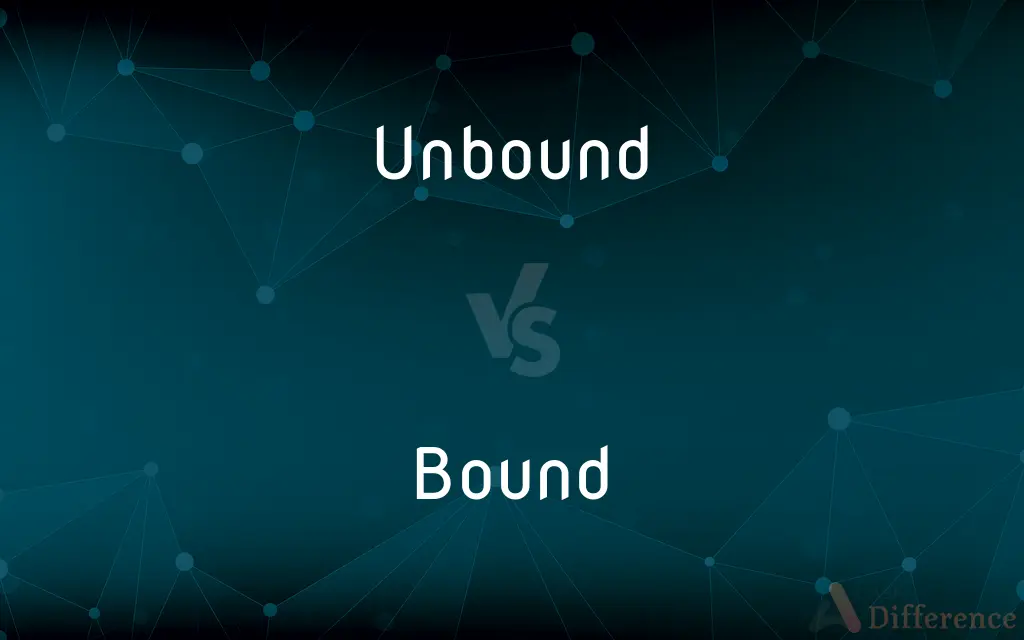Unbound vs. Bound — What's the Difference?
By Urooj Arif & Maham Liaqat — Updated on April 27, 2024
Unbound refers to something not confined or tied, allowing freedom of movement or action, while bound implies a state of being tied, constrained, or obligated.

Difference Between Unbound and Bound
Table of Contents
ADVERTISEMENT
Key Differences
Unbound represents a state of freedom, where there are no physical or metaphorical restraints limiting movement or action. This could refer to a book not yet placed in a cover or a person not restricted by social conventions. Whereas, bound typically indicates that something is held within limits, whether those are physical restraints, like a book bound by a cover, or metaphorical ones, such as a person bound by duties or promises.
The term unbound often connotes liberation and the potential for unrestricted development or change. On the other hand, bound can imply security and structure, providing a predictable framework within which something operates.
In literary terms, an unbound manuscript refers to loose pages, giving the sense of work in progress or flexibility in modification. Conversely, a bound book is finished, its pages securely fastened, symbolizing completion and durability.
For individuals, being unbound might mean freedom from commitments or constraints, allowing for personal exploration and growth. In contrast, being bound—whether to a job, a location, or a set of rules—often involves a degree of sacrifice of freedom in exchange for something else, like stability or fulfillment of responsibilities.
The impact of these states extends to various fields. In technology, unbound software could be versatile and customizable, while bound software adheres strictly to predefined specifications or licensing restrictions.
ADVERTISEMENT
Comparison Chart
Definition
Not confined or tied
Confined or obligated
Connotation
Freedom, flexibility
Restriction, obligation
Literary Example
Loose pages (manuscript)
Securely fastened book
Personal Impact
Allows exploration, growth
Involves commitments, stability
Technological Context
Customizable software
Software with set specifications
Compare with Definitions
Unbound
Open to various possibilities.
The unbound potential of the technology was exciting.
Bound
Restricted by circumstances or rules.
Bound by tradition, they followed the old methods.
Unbound
Free from restrictions.
He felt unbound by traditional career paths.
Bound
Obligated by a commitment.
She was bound by her promise to lead the project.
Unbound
Liberated from constraints.
The agreement left her financially unbound.
Bound
Tied or secured tightly.
The documents were bound with a strong ribbon.
Unbound
Not tied or secured.
The papers were left unbound on the desk.
Bound
Heading to a certain destination.
The train was bound for Chicago.
Unbound
Not confined within a cover (of a book).
They printed the first draft of the novel in an unbound format.
Bound
Confined within a cover (of a book).
His thesis was finally bound and submitted.
Unbound
Not bound or tied up
They were unbound by convention
Her hair was unbound
Bound
Walk or run with leaping strides
Shares bounded ahead in early dealing
Louis came bounding down the stairs
Unbound
Past tense and past participle of unbind.
Bound
Form the boundary of; enclose
The ground was bounded by a main road on one side and a meadow on the other
Unbound
Not bound
Unbound manuscripts.
An unbound book.
Bound
Past and past participle of bind
Unbound
Freed from bonds or restraints; released
An unbound captive.
Bound
A leaping movement towards or over something
I went up the steps in two effortless bounds
Unbound
Simple past tense and past participle of unbind
Bound
A territorial limit; a boundary
The ancient bounds of the forest
Unbound
Not bound; not tied up.
The hostages' hands were left unbound.
Bound
Certain to be or to do or have something
There is bound to be a change of plan
Unbound
Without a binding.
An unbound book
Bound
Restricted or confined to a specified place
His job kept him city-bound
Unbound
Lying beyond the proton or neutron drip line; having a negative particle separation energy; capable of decaying by the spontaneous exothermic emission of one or more nucleons.
Helium-2 is unbound, as it is energetically favorable for it to split into two separate protons.
Bound
(of a book) having a specified binding
Fine leather-bound books
Unbound
Not secured within a cover;
An unbound book
Bound
(of a grammatical element) occurring only in combination with another form.
Unbound
Not restrained or tied down by bonds
Bound
Going or ready to go towards a specified place
An express train bound for Edinburgh
The three moon-bound astronauts
Unbound
Not held in chemical or physical combination
Bound
To leap forward or upward; jump; spring
The dog bounded over the gate.
Bound
To move forward by leaps or springs
The deer bounded into the woods.
Bound
To spring back from a surface; rebound
The basketball bounded off the backboard.
Bound
To set a limit to; confine
A high wall that bounded the prison yard.
Lives that were bounded by poverty.
Bound
To constitute the boundary or limit of
A city park that was bounded by busy streets.
Bound
To identify the boundaries of; demarcate.
Bound
To border on another place, state, or country.
Bound
Past tense and past participle of bind.
Bound
A leap; a jump
The deer was away in a single bound.
Bound
A springing back from a surface after hitting it; a bounce
Caught the ball on the bound.
Bound
Often bounds A boundary; a limit
Our joy knew no bounds. Your remarks exceed the bounds of reason.
Bound
Bounds The territory on, within, or near limiting lines
The bounds of the kingdom.
Bound
Confined by bonds; tied
Bound hostages.
Bound
Being under legal or moral obligation
Bound by my promise.
Bound
Equipped with a cover or binding
Bound volumes.
Bound
Predetermined; certain
We're bound to be late.
Bound
Determined; resolved
Many public policy students are bound to be politicians one day.
Bound
(Linguistics) Being a form, especially a morpheme, that cannot stand as an independent word, such as a prefix or suffix.
Bound
Constipated.
Bound
Headed or intending to head in a specified direction
Commuters bound for home.
A south-bound train.
Bound
Simple past tense and past participle of bind
I bound the splint to my leg.
I had bound the splint with duct tape.
Bound
To surround a territory or other geographical entity; to form the boundary of.
France, Portugal, Gibraltar and Andorra bound Spain.
Kansas is bounded by Nebraska on the north, Missouri on the east, Oklahoma on the south and Colorado on the west.
Bound
To be the bound of.
Bound
(intransitive) To leap, move by jumping.
The rabbit bounded down the lane.
Bound
(transitive) To cause to leap.
To bound a horse
Bound
To rebound; to bounce.
A rubber ball bounds on the floor
Bound
To cause to rebound; to throw so that it will rebound; to bounce.
To bound a ball on the floor
Bound
(with infinitive) Obliged (to).
You are not legally bound to reply.
Bound
That cannot stand alone as a free word.
Bound
Constrained by a quantifier.
Bound
(dated) Constipated; costive.
Bound
Confined or restricted to a certain place; e.g. railbound.
Bound
Unable to move in certain conditions; e.g. snowbound.
Bound
(obsolete) Ready, prepared.
Bound
Ready to start or go (to); moving in the direction (of).
Which way are you bound?
Is that message bound for me?
Bound
(with infinitive) Very likely (to), certain to
They were bound to come into conflict eventually.
Bound
A boundary, the border which one must cross in order to enter or leave a territory.
I reached the northern bound of my property, took a deep breath and walked on.
Somewhere within these bounds you may find a buried treasure.
Bound
(mathematics) A value which is known to be greater or smaller than a given set of values.
Bound
A sizeable jump, great leap.
The deer crossed the stream in a single bound.
Bound
A spring from one foot to the other in dancing.
Bound
(dated) A bounce; a rebound.
Bound
The external or limiting line, either real or imaginary, of any object or space; that which limits or restrains, or within which something is limited or restrained; limit; confine; extent; boundary.
He hath compassed the waters with bounds.
On earth's remotest bounds.
And mete the bounds of hate and love.
Bound
A leap; an elastic spring; a jump.
A bound of graceful hardihood.
Bound
Rebound; as, the bound of a ball.
Bound
Spring from one foot to the other.
Bound
To limit; to terminate; to fix the furthest point of extension of; - said of natural or of moral objects; to lie along, or form, a boundary of; to inclose; to circumscribe; to restrain; to confine.
Where full measure only bounds excess.
Phlegethon . . .Whose fiery flood the burning empire bounds.
Bound
To name the boundaries of; as, to bound France.
Bound
To move with a sudden spring or leap, or with a succession of springs or leaps; as the beast bounded from his den; the herd bounded across the plain.
Before his lord the ready spaniel bounds.
And the waves bound beneath me as a steedThat knows his rider.
Bound
To rebound, as an elastic ball.
Bound
To make to bound or leap; as, to bound a horse.
Bound
To cause to rebound; to throw so that it will rebound; as, to bound a ball on the floor.
Bound
Restrained by a hand, rope, chain, fetters, or the like.
Bound
Inclosed in a binding or cover; as, a bound volume.
Bound
Under legal or moral restraint or obligation.
Bound
Constrained or compelled; destined; certain; - followed by the infinitive; as, he is bound to succeed; he is bound to fail.
Bound
Resolved; as, I am bound to do it.
Bound
Constipated; costive.
Bound
Ready or intending to go; on the way toward; going; - with to or for, or with an adverb of motion; as, a ship is bound to Cadiz, or for Cadiz.
Bound
A line determining the limits of an area
Bound
The line or plane indicating the limit or extent of something
Bound
A light springing movement upwards or forwards
Bound
Move forward by leaps and bounds;
The horse bounded across the meadow
The child leapt across the puddle
Can you jump over the fence?
Bound
Form the boundary of; be contiguous to
Bound
Place limits on (extent or access);
Restrict the use of this parking lot
Limit the time you can spend with your friends
Bound
Spring back; spring away from an impact;
The rubber ball bounced
These particles do not resile but they unite after they collide
Bound
Held with another element, substance or material in chemical or physical union
Bound
Confined by bonds;
Bound and gagged hostages
Bound
Secured with a cover or binding; often used as a combining form;
Bound volumes
Leather-bound volumes
Bound
(usually followed by `to') governed by fate;
Bound to happen
An old house destined to be demolished
He is destined to be famous
Bound
Covered or wrapped with a bandage;
The bandaged wound on the back of his head
An injury bound in fresh gauze
Bound
Headed or intending to head in a certain direction; often used as a combining form as in `college-bound students';
Children bound for school
A flight destined for New York
Bound
Bound by an oath;
A bound official
Bound
Bound by contract
Bound
Confined in the bowels;
He is bound in the belly
Common Curiosities
How does binding affect a book?
Binding a book involves securing its pages within a cover, which protects the pages and gives the book a durable structure.
What does being legally bound mean?
Being legally bound means having a legal obligation to perform certain actions or adhere to certain rules as specified by a contract or law.
Can a person be both bound and unbound in different aspects?
Yes, a person can be bound in one aspect of life, like career obligations, while being unbound in another, such as personal hobbies or travel.
What are the benefits of being unbound in a professional context?
Being unbound professionally allows for greater creativity, adaptability, and the opportunity to explore unconventional paths or solutions.
What types of books are typically left unbound?
Manuscripts, proofs, and other pre-publication materials are typically left unbound to facilitate editing and reviewing.
What does it mean when software is described as unbound?
Software described as unbound typically offers high flexibility and customization options without strict operational limits.
What are bound duties?
Bound duties are responsibilities that one is obligated to fulfill, often due to legal, moral, or personal commitments.
How can a society be bound?
A society can be bound by its cultural norms, laws, and social expectations, which dictate acceptable behavior and social interactions.
Is being unbound always positive?
While being unbound offers freedom and flexibility, it can also lead to a lack of structure or security, which isn't always ideal depending on the context.
How do contractual bounds work in business?
In business, contractual bounds are agreements that legally obligate parties to perform specific actions or uphold terms outlined in a contract.
Share Your Discovery

Previous Comparison
About vs. On
Next Comparison
Reflection vs. MirroringAuthor Spotlight
Written by
Urooj ArifUrooj is a skilled content writer at Ask Difference, known for her exceptional ability to simplify complex topics into engaging and informative content. With a passion for research and a flair for clear, concise writing, she consistently delivers articles that resonate with our diverse audience.
Co-written by
Maham Liaqat















































